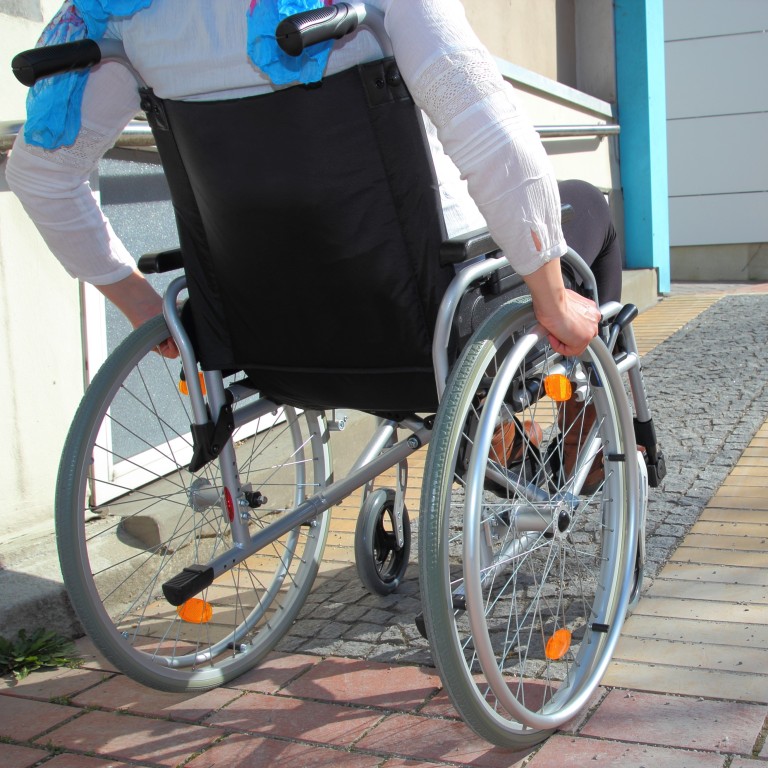
Hong Kong patient group launches city’s first registry for people with ALS, in bid to gather data about rare motor neurone disease
- First phase of registration shows patients need average of one year to be diagnosed, while two-thirds are ‘severely disabled’
- Hong Kong Neuro-Muscular Disease Association, which created registry, calls on authorities to use data to improve patient care and set up specialist clinics
A Hong Kong patient group on Sunday launched the city’s first registry for people diagnosed with amyotrophic lateral sclerosis (ALS), in a bid to gather data about the rare motor neurone disease and the needs of those living with it.
The first phase of registration collected information on 46 patients, about a quarter of those with the disease in the city, and discovered that they waited a year on average to be diagnosed. Two-thirds were considered “severely disabled”, according to the Hong Kong Neuro-Muscular Disease Association.
Jintana Sae Sow, a social worker from the association, said it was looking to build on the registry by providing the same service for patients of other neuromuscular diseases.
“We hope to develop registries for other neuromuscular diseases so that we can collect data of their onsets and analyse them,” she said. “The government also needs to have the data to know what the patients need.”
Imagine hearing ‘there is no treatment available’: the rare disease battle
The registry was developed with the help of local medical school students Minnie Au and Marina Chan Hoi-ching, who interviewed the initial batch of patients between June last year and this month. Carers of ALS patients are included in the new registry.
ALS, also known as Lou Gehrig’s disease, is the most common form of motor neurone disease, with early symptoms including stiffness, muscle twitches, gradual weakening and muscle wasting. Some also experience weakness in their extremities and difficulties in speaking or swallowing.
The degenerative disease leads to a loss of muscle control, with many eventually succumbing to respiratory failure, such as pneumonia, because of sputum build-up in their air passages or lungs.
A genetic cause can be identified in only a tenth of those with ALS, while the origin is unknown for the rest.

No cure or effective treatment exists to reverse its progression.
Kwok Tsz-kin, a consultant doctor at the association, said: “Most patients can only see their condition deteriorating, despite having a functional thinking capacity and unaffected senses of hearing, sight, smell and taste.”
Analyses of the new registry found that after the first onset of the disease, patients needed to see four doctors and wait one to two years before they could be diagnosed. In that time, two-thirds could have already developed severe disabilities, such as reduced ability to speak and difficulties in swallowing and breathing.
The findings also showed that after their condition worsened, about half the patients died within the following nine months.
‘She said I should just kill myself’: Hong Kong teacher with rare condition
The average medical expenses also amounted to HK$13,068 (US$1,670) per month, including supervisory care and rental of life-support equipment, with out-of-pocket expenditure reaching HK$90,000.
A suction device used to help patients discharge sputum, a mixture of saliva and mucus, from their respiratory tracts could cost as much as HK$60,000, according to the association social worker.
ALS patients and their carers also said the government did not provide enough financial help or medical attention.
Cheng Kim-fung, 55, said he was diagnosed with ALS in 2021 and soon lost the ability to swallow food, breathe and speak, leaving him only able to communicate with others through text-to-speech software on his phone. His wife then became the sole breadwinner for Cheng and their three children.
Proton therapy centre offers Hong Kong cancer patients more targeted treatment
Cheng spends HK$3,000 a month for a ventilator, which is not covered by subsidies.
“The government disability allowance is not enough to cover medical expenses,” Mrs Cheng said. “The ventilator we are currently using cannot be subsidised. We can only rent it at our own expense.”
The association said the government could improve patient care and set up specialist clinics for those with neuromuscular diseases following the establishment of the registry.
The Hospital Authority said it would make reference to the registry to “understand the needs and concerns” of ALS patients.
“The Hospital Authority will continue to work closely with different medical social organisations and patient groups to enhance support to ALS patients,” a spokesman said.
“Public hospitals are now providing integrated services for ALS patients … in accordance to their clinical conditions and needs.”
